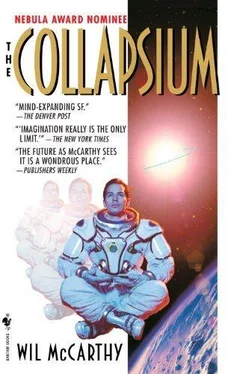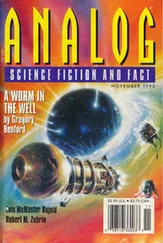“You look up to him,” Bruno said, eyeing his counterpart with disgust.
“I know more about him than you do,” Muddy said darkly. “I know a lot more than you, about a great many things. In some ways, I’m finding it easier to think of you as a child than as a full-grown veteran of worldly politics and strife. I can reconcile your behavior that way, your attitudes.”
Bruno sighed. “So I’m a fool, am I? Because my mind has never been shaped by humiliation or pain? What a pitiable creature you are, Muddy. I’ll remain a fool, thank you.”
“No, sir, no!” Muddy cried, throwing an arm melodramatically across his eyes. “Not a fool, a child . A’s-s-sweet, bright-eyed little boy that Enzo and Bernice would be proud to show off! It isn’t a bad thing, sir. I never said it was.”
And Bruno felt ashamed then, because tears were soaking Muddy’s sleeve, rolling down his gaunt face, and his voice, never strong to begin with, had broken through with high, squeaky sobs. And, more shameful still, Bruno himself could think of no response, no comfort, no apology save another cup of hot soup. This was what he’d become: a hermit unable to comport civilly, even with himself.
Perhaps Marlon was right to despise him.
Chapter Sixteen
in which a restless spirit is appeased
Bruno sat up in his bed, suddenly wide awake, his body as rigid as a gravestone. Such a dream. Such a dream he’d had!
He’d never been much of a dreamer, had never put much stock or faith in a state of mind so confused and cluttered with false associations. A duck asks if your latest calculations are thorough enough, and the wall becomes a floor beneath you, and suddenly it’s raining macaroni. Rubbish! But tonight he’d dreamed with strange clarity: his skin shivering as if electrified, his mouth dry, his eyes hot with the energies of the zero-point field, laid out visibly before him. Or perhaps “visibly” was the wrong word, since he was simultaneously aware of the intensities at every wavelength, the half-infinite energies filling each photon state… The view should have been nonsense, infinitely bright or infinitely dark or else infinitely transparent , as the vacuum between islands of matter was usually thought to be. But in the dream he’d walked through his house, through the gardens and meadows of his empty little world, and he’d seen not only the things , but the rippling vibrations of charge that gave rise to them, and the zero-point vacuum that inspired the vibrations, and the true vacuum beneath that.
And in the dream, he’d pulled a special glove down over his hand, and the glove was made of billion-ton black holes the size of protons, and its color was neither the phosphor green of gravitational binding nor the Cerenkov blue of mature collapsium, but the optically superconducting nothing of True Vacuum, for the black holes were not arranged in three-dimensional lattices, but in ripples of semi-random, four-dimensional, open-celled foam. Vibration-damping foam, just exactly like what you’d find muffling the walls of a broadcast studio, although fantastically smaller. The four-dimensional structure was easy, simply a matter of timing the placement of certain elements. A child, he’d thought, could do the math.
And in the dream, the storming vacuum energies had shrunk away from his glove like wax before a torch, and the space before him had filled with nothingness, and he’d glided through it without effort, skating through the hills and meadows without moving his feet, without any sensation of moving at all. In the dream, the universe had moved, or seemed to, while he stood motionless at its center.
And he’d realized, all at once, that this was no talking duck or pasta rain, that this was something he could actually do . And so, in the dream, he’d sat bolt upright in his bed, and the dream had blended so seamlessly with reality that he’d wondered, in a deep and literal sense, if the two were really such separate things after all.
For a moment he felt paralyzed, glued in place by the bogus “inertia” of the vacuum pressing in on him from all sides. It seemed impossible that he should be able to breathe, that his blood should pump and his nerves fire, that he should be able to exist at all. But he did exist, and his blood pumped, and his nerves fired, and as the moment passed he was kicking his covers off, leaping to the floor in his bare feet, screaming “Door! Door!” at the wall and running right on through, trusting it to open for him in time.
“Muddy!” he shouted, racing toward the bony figure curled up on the couch beneath a heap of blankets. “Muddy, wake up! I’ve had an idea!”
Muddy, it seemed, was no stranger to sudden, screaming awakenings in the dead of the night. He sat up immediately, latching onto Bruno with quick, terrified eyes.
“I’ve had an idea!” Bruno repeated. “A big one, a wonderful one!”
“Yes?” Muddy said warily, making a visible effort not to scream or retreat or clutch at his chest. “A helpful idea?”
“You be the judge,” Bruno said quickly, and launched into an account of his dream.
“Oh,” Muddy said when he was done. His finger probed at the air, as if trying to feel the vacuum energies there. “Oh. Oh, yes, that’s-s-sounds like it should work. That’s very good, Your Declarancy; the simplicity of the math is a very good sign. I think you must be onto something.”
“I have work to do,” Bruno said excitedly. “Lots of work! It’s another damned invention, I suppose. We’ll see all of society turned on its ear again, bent and twisted around these momentary insights. What a strange thing that is, to cause such trouble and be adored for it. The Queendom should hang us both for our crimes, and save itself any further turmoil! But I’ll say, even the worst outcome is bound to improve on what Marlon has in store.”
“Likely so,” Muddy agreed, “if it has come in time to stop him. I don’t suppose this is the sort of thing even He can anticipate. A bolt of inspiration,‘s-s-striking from nowhere? Our muse usually comes when it jolly well pleases her, without regard for when she’s actually needed.”
Muddy seemed far more saddened than intrigued, and at this, Bruno felt genuine pity for him, for perhaps the first time. Was his counterpart so broken that even the lure of discovery couldn’t enliven him? He must have suffered grievously indeed.
“Come,” Bruno said, extending him a hand. “You remember the boat I built—that you built—on the yard at Talafo’uo?”
“HMS Redshift ,” Muddy said wanly. “By gods, it seems so long ago.”
Indeed, it did. Bruno had been fresh to the islands of Tonga, and the task had seemed simple enough: design and fax the parts, assemble them, and motor away on a full-planing hull that would leap from one wave crest to the next, barely touching the water at all. But Bruno had—as a matter of principle— refused both robotic and human assistance. That old Girona stubbornness again, so that even with the best tools and guidebooks money could buy, even with his modular, snap-together design and hundreds of real-world examples to compare his work against, the little boat had wound up taking a full week to come together, and another three to really start performing well. There were a lot of variables to control; the experience had been both humbling and uplifting, after his larger and more troublesome successes with the early telecom collapsiters.
“I would ask you to repeat that experience,” Bruno said.
“That? It took weeks.”
“You’ll let robots do the work, of course. It must be done quickly. But be a hero, Muddy: build me a spaceship. I haven’t time to do it myself; this idea demands attention. But when we’re both done, perhaps we’ll ride to the Queendom’s rescue.” When there was no reply, he went on, “Are you able to face your puerile, damnable little nemesis? Has he left you with any ability to oppose him?”
Читать дальше












